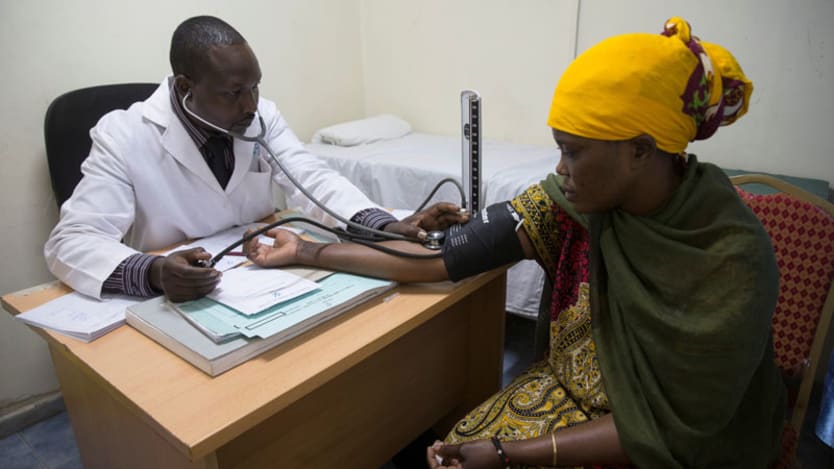
NAIROBI — The biggest barriers to global health progress are “hurdles of the mind” and these could jeopardize the chances of achieving universal health coverage, says Siddharth Chatterjee, United Nations resident coordinator to Kenya.
Speaking from inside the U.N. headquarters in Nairobi, he explained that individuals both inside and outside the global health sector are not being forward-thinking enough about how they view health systems — especially when it comes to sexual reproductive health and rights — but that innovative, out-of-the-box thinking would be critical to making advances.
“If we can make sure that the sexual reproductive health and rights of a girl and of a woman are protected and safeguarded, we will never go down the road where UHC [universal health coverage] becomes unachievable. In fact, it makes it exponentially faster,” Chatterjee said. He added that changing the minds of community and religious leaders in Kenya — who have at times spoken out about gender equality and age of consent because of references in holy books — is key.
“Regardless of education, I’m not sure it necessarily emancipates us from our prejudices, and so I think those are the places we will have to see changes,” Chatterjee said, adding that technology, social media, and evidence are the tools needed to make those changes.
In an interview with Devex, he spoke about how the global health sector can change attitudes and beliefs, and which organizations are already thinking more innovatively.
“We must be able to influence the best thinking, the best thought policy, the best minds, and bring them together.”
— Siddharth Chatterjee, U.N. resident coordinator, KenyaThis interview has been edited for length and clarity.
What is the current status of health and specifically maternal health in Kenya?
In Davos [at the World Economic Forum Annual Meeting], we decided that the way to go is to look at UHC and the president of this country has decided that his legacy would be decided by what is called the “Big Four” agenda: UHC; food security and nutrition; affordable housing; and enhancing manufacturing.
What we’ve said collectively is for the success of UHC, we need to address SRHR where a woman can decide when to have a family, she has information and knowledge, is imparted with choices, and not forced into anything.
I believe that the future of public health will be defined by SRHR. Without that, it’s not going to happen.
What have we done as the U.N. family? We’ve focused our efforts behind the Big Four agenda and said the spirit of the Sustainable Development Goals is to reach the furthest behind first and to leave no one behind.
That’s what we are doing, which means we’re revamping and rearranging the way we do business in order to be fit-for-purpose and to respond to the U.N. secretary-general’s vision of a U.N. that is capable, talented, multisectoral, and delivering as one. That can only happen when we start to rearrange the way we are intellectually too.
It was Alvin Toffler who said the illiterate are not those who cannot read and write, it’s those who cannot unlearn and relearn. This is what we’re trying to do.
How do you change attitudes and beliefs?
Have you ever sold your car? Have you put it on the internet and suddenly 10,000 people can see it? What could take 50 or 60 years, today technology leapfrogs. From one tweet to an email, to an SMS, to messaging on YouTube — today we have entire social media platforms for that transformation. We had 26 million impressions on Twitter and that was the product of a three-month campaign. It’s repetition.
When you tell somebody who is forgetful 10 times what your name is, trust me by the time you’ve finished that conversation, that person will remember the name for a while to come.
That’s the nature of social media. You need to be in their face, so the moment they turn to Facebook, the first message that comes up says “safeguard maternal health, you safeguard the wealth of a nation.” [We need] messaging that is smart, well-equipped, and connects with the younger generation.
Those are the things we have to embrace for the positive advances we want to see in humanity, and that’s how the U.N. is also changing. If you notice how António Guterres, our secretary-general, and the deputy secretary-generals are really pushing this whole agenda of U.N. delivery as one, it’s not compartmentalized into our respective areas of influence, but looks at how we bring all those areas and comparative advantages together.
I think technology gives us the ability to leapfrog that kind of change.
Do you think there’s work to be done in changing attitudes of those specifically within the development sector?
Exactly, absolutely. I didn’t want to say that as clearly as that, but yes, I do find considerable opposition, but that has started to change.
[You change attitudes within the sector] when they see results, and I think your best bet is getting results on the ground that get everybody together. Unorthodoxy is always seen as being out of step, but I believe that it is change agents who have always been able to think differently.
Are there organizations where you can see that change in thinking already happening?
Absolutely. Today UNFPA, UNICEF, UNAIDS, and the World Health Organization here in Kenya have all aligned to this whole idea and are moving together with this.
In Kenya, you’re actually seeing the U.N. delivering as one. We have much further to go, but this is where we’ll be. We must be able to influence the best thinking, the best thought policy, the best minds, and bring them together.
There are plenty of NGOs, plenty of civil society organizations doing really good work, but our real value is going to be when we can reach the last mile, that’s where it’s going to count.








